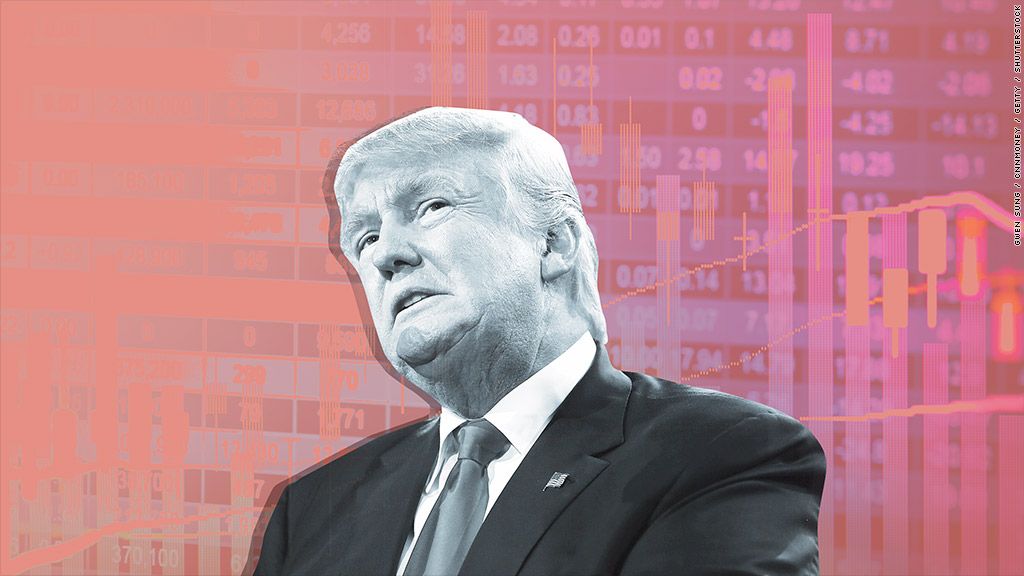
Donald Trump, who famously called himself the "king of debt," may have ironically brought about the end of Wall Street's golden age in debt.
Societe Generale warned investors this week that the decade-long party in the debt markets "is over." Borrowing costs are poised to rise rapidly, hurting the economy and fueling a stampede out of debt funds more powerful than what markets expect.
"Prepare for a serious hangover," SocGen wrote in a report on Monday.
An "unprecedented build-up of debt" over the past decade will likely worsen the pain and make any bond selloff "more dangerous," the firm said.
Already, there are signs that the music has stopped in this popular corner of the markets.
Trump's election and plans to stimulate the American economy by borrowing money has fueled a massive bet on stronger growth and more inflation. When that happens, investors tend to dump boring bonds in favor of risky stocks.
While stocks have soared to record highs, behind the scenes there's been a "violent" wave of selling in the bond markets, bumping up borrowing costs. The 10-year Treasury yield has skyrocketed to 2.34%, compared with 1.85% on Election Day. It's increased the price of other forms of credit, including mortgages.
Related: 2 powerful market forces could hurt Trump's plans
Bank of America Merrill Lynch called it a "stampede" out of bond funds. Investors yanked $18 billion out of bond funds in the week after the election, the most dramatic outflow in 3.5 years.
Trump's "unanticipated rise" has let some of the air out of the "bond market bubble," S&P Global wrote in a report on Tuesday.
Some believe the post-election rush out of bonds and into stocks may be overdone and due for a reversal. That may be true. After all, the end of the bond bubble has been wrongly called many times in recent years.
But here's why SocGen thinks this is just the beginning of a larger "unwinding."
Growth pick-up: Even before Trump's election, the economy appears to have gathered momentum. The U.S. economy grew at a healthy 3.2% in the third quarter, the best pace in two years. Wall Street thinks the economy could grow even faster given Trump's promises to provide stimulus by cutting taxes and ramping up infrastructure.
Central banks take a back seat: Fiscal stimulus may allow the Federal Reserve and other central banks to ease off the emergency steps that had been keeping rates super low. The Fed is widely expected to raise rates in December for the second time since 2007. However, expectations are that the momentum on rate increases will only pick up next year.
Inflation showing signs of life: SocGen said inflation is "bottoming out," a trend that should hurt demand for debt and allow central banks to further raise interest rates. For instance, U.S. wages grew in October by the fastest since June 2009.
Adding to American debt: Trump's planned tax cuts and infrastructure spending may "substantially raise the deficit," SocGen said. Trump's fiscal proposals will cause the U.S. debt to soar to 105% of GDP by 2026, compared with nearly 77% today, according to estimates from the Committee for a Responsible Federal Budget.
Sign up for CNNMoney's morning market newsletter: Before The Bell
If the debt party is truly over, the consequences could be massive for global financial markets.
Obviously, this would be bad news for bond funds, which have become very popular during the recent boom. Keep in mind that the market value of investment grade bonds tracked by Barclays Global Aggregate Fund has doubled over the past decade to a stunning $45 trillion, according to SocGen.
Performance in large bond funds is already "fast deteriorating" and losses and withdrawals will only continue if rates keep rising, SocGen predicted.
But bond investors are no different than the people who invest in the stock market. That means the pain in bonds could force selling that spills over into the broader markets.
Even after the recent turmoil, rates remain very low. But if they continue to rise, that could hurt the economy by translating to higher borrowing costs. Already, mortgage rates have risen significantly, making it more expensive to buy a home. This powerful force could make Trump's plans for an economic boom more difficult to achieve.
Likewise, higher rates translates to elusive credit for companies without the perfect balance sheets of Apple (AAPL). Recall that the shale oil revolution that has transformed the global energy landscape was partially fueled by easy credit.
Another potential consequence: trouble for emerging markets. That's because the recent debt turmoil has coincided with a stronger U.S. dollar, which makes it harder for overseas borrowers to pay back dollar-denominated debt. SocGen estimates that dollar-denominated credit overseas has doubled to nearly $10 trillion over the past decade, especially in emerging markets.


